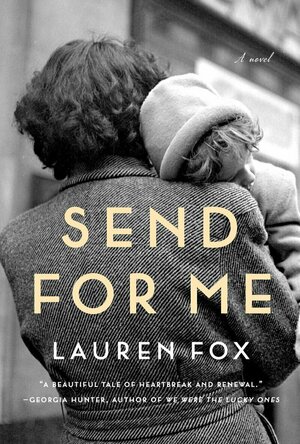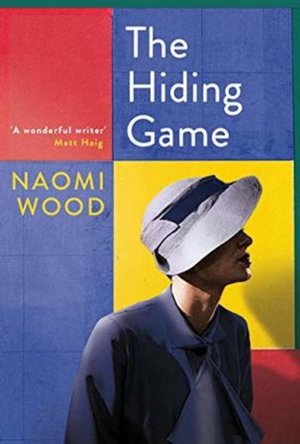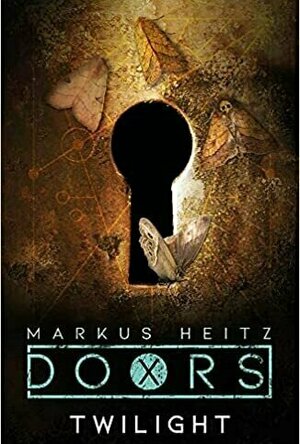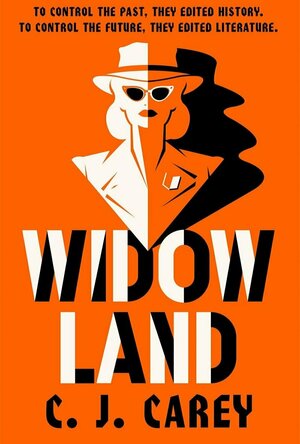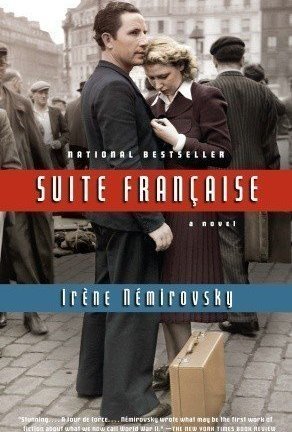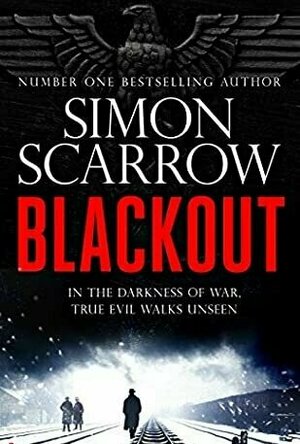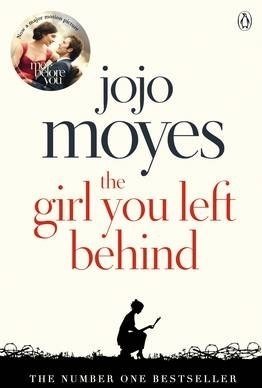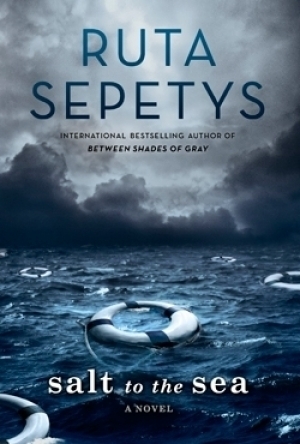Search
Search results
ClareR (5879 KP) rated Send For Me in Books
Sep 7, 2021
Send For Me is an emotionally charged look at the lives of three generations of women: Klara, Annalise and Clare. Annalise is German, a Jew living in Feldenheim at a time when it was dangerous to be Jewish - whether you were a practicing Jew or not. After years of persecution, Annalise, her husband and her toddler daughter, manage to get permission to leave for the USA. But she has to leave her parents behind.
This was a different take on other books set at this time, and I liked that about it very much. I haven’t read many books about those who managed to escape the Nazi regime and immigrate to safe countries before the Holocaust really began. But it’s no less saddening for that. Annalise desperately misses her parents, and life is so utterly different in the US.
The story swaps between Annalise and her granddaughter, Clare, whose life couldn’t have been any more different. Clare has the much more liberated life of an American woman - whether that’s what she really wants, remains to be seen.
I really enjoyed seeing the juxtaposition between a 1930s immigrant and a modern young woman. Annalise’s fear of being in a big city with no English is palpable - I panicked along with her. It must be so scary to move somewhere that’s completely different to your own life experience, and not even have a common language - something that people have always had to endure for their own safety throughout the ages.
This is a really moving novel, made more so when I learnt that the letters between Annalise and her mother Klara were real - just that the names were changed.
This was a different take on other books set at this time, and I liked that about it very much. I haven’t read many books about those who managed to escape the Nazi regime and immigrate to safe countries before the Holocaust really began. But it’s no less saddening for that. Annalise desperately misses her parents, and life is so utterly different in the US.
The story swaps between Annalise and her granddaughter, Clare, whose life couldn’t have been any more different. Clare has the much more liberated life of an American woman - whether that’s what she really wants, remains to be seen.
I really enjoyed seeing the juxtaposition between a 1930s immigrant and a modern young woman. Annalise’s fear of being in a big city with no English is palpable - I panicked along with her. It must be so scary to move somewhere that’s completely different to your own life experience, and not even have a common language - something that people have always had to endure for their own safety throughout the ages.
This is a really moving novel, made more so when I learnt that the letters between Annalise and her mother Klara were real - just that the names were changed.
ClareR (5879 KP) rated The Hiding Game in Books
Sep 8, 2019 (Updated Sep 9, 2019)
A completely engrossing novel about Weimar, Bauhaus and complicated relationships
The Hiding Game is set mostly in the period between the two World Wars at the Bauhaus art school. This was a time of great change in Germany, both politically and artistically. Paul Beckermann starts his study at Bauhaus in 1922, and forms one of a group of six friends. He falls in love with the unobtainable Charlotte, a young woman from Czechoslovakia, but she loves Jenö, who in turn is loved by Paul’s best friend Walter. It seems like an impossible love triangle (or even a square?!). These strong feelings lead to betrayal in a time that it was very easy to utterly destroy lives. The six friends drift apart, mainly out of necessity (Bauhaus was not liked at all by the traditionalists in the National Socialist party), but also they just couldn’t be together anymore.
Paul, as an older man living in England, looks back at this period in his life and how it went tragically wrong. Not all of the six friends were as fortunate as he was.
It’s a heartbreaking and also a suspenseful novel. Someone with only a limited knowledge of this period will know of the kind of tragedy that could befall people then. Paul’s guilt and sadness are palpable throughout the book, and I really felt for him. This isn’t really a book where the characters find some sort of forgiveness for themselves - there is none to find. Terrible things happened, and the survivors had to find a way to live with themselves afterwards.
I loved the details about Bauhaus. I did some study on it during my German degree, and it filled in some gaps in my knowledge (there are quite a few gaps to fill when you did that degree 25 years ago!), and I’m always on the lookout for books set in Germany, especially those with a good helping of history (this has it in spades!). And for me, this really didn’t disappoint. I loved it, and I’ll be recommending it to friends (ex-German degree friends as well!).
Many thanks to NetGalley and Picador for my copy of this wonderful book.
Paul, as an older man living in England, looks back at this period in his life and how it went tragically wrong. Not all of the six friends were as fortunate as he was.
It’s a heartbreaking and also a suspenseful novel. Someone with only a limited knowledge of this period will know of the kind of tragedy that could befall people then. Paul’s guilt and sadness are palpable throughout the book, and I really felt for him. This isn’t really a book where the characters find some sort of forgiveness for themselves - there is none to find. Terrible things happened, and the survivors had to find a way to live with themselves afterwards.
I loved the details about Bauhaus. I did some study on it during my German degree, and it filled in some gaps in my knowledge (there are quite a few gaps to fill when you did that degree 25 years ago!), and I’m always on the lookout for books set in Germany, especially those with a good helping of history (this has it in spades!). And for me, this really didn’t disappoint. I loved it, and I’ll be recommending it to friends (ex-German degree friends as well!).
Many thanks to NetGalley and Picador for my copy of this wonderful book.
Ross (3284 KP) rated Doors: Twilight in Books
Mar 24, 2021
Great idea, poorly executed
The idea behind the Doors books is that of three different versions of a story with a shared beginning, but the stories diverge when the characters go through one of three (actually five but two are ignored as far as I'm aware!) doors. A team of people, each hired for their own area of expertise, are tasked with rescuing a rich German man's daughter who has wandered down into the mysterious cellar of their former family home, where a series of doors are believed to lead to strange new places.
The first quarter of these books is identical, with the damsel in distress being introduced and the team coming together and being given their tasks. At this stage, there is next to no organisation around their approach, it really is simply a bunch of people heading into the unknown and being drastically under-prepared. When the team quickly find the missing and take her back to the surface, the reader is left somewhat taken aback at the speed with which it was resolved. This is nothing compared to how the reader feels when the team go back looking for the real missing woman, simply based on their employer's assistant's momentary mistake that the woman's eyes were the wrong colour. This is not challenged by anyone in the team, who head back downstairs. It's a bigger WTF moment than the Batman vs Superman 'Martha' fiasco.
As with some of Heitz's Dwarves books, I think this suffered from fairly poor translation, as a number of phrases and words just are not clear. At no point did i really know where the team were heading, forwards or backwards, which door they went through etc.
And the promise of heading into the future was very much an empty one. Some members of the team briefly find themselves in near-future Frankfurt and there is a short section of the book which adds no value and has no connection to the rest of the book whatsoever. Thereafter, there is just some cliched mysterious dark maze adventures, with some unexplained conspiracy around the use and beginnings of the doors and their purpose. (I am currently around 80% of the way through the 'Colony' book, having mercifully skipped the first, repeated, quarter, and am starting to realise that there is likely to be an overall story arch that only becomes clear once the reader has read all three books).
This book, and the series as a whole, offered so much potential and teased so much, but this one at least completely failed to deliver for me.
Advance copy received from NetGalley and the publishers in exchange for an honest review.
The first quarter of these books is identical, with the damsel in distress being introduced and the team coming together and being given their tasks. At this stage, there is next to no organisation around their approach, it really is simply a bunch of people heading into the unknown and being drastically under-prepared. When the team quickly find the missing and take her back to the surface, the reader is left somewhat taken aback at the speed with which it was resolved. This is nothing compared to how the reader feels when the team go back looking for the real missing woman, simply based on their employer's assistant's momentary mistake that the woman's eyes were the wrong colour. This is not challenged by anyone in the team, who head back downstairs. It's a bigger WTF moment than the Batman vs Superman 'Martha' fiasco.
As with some of Heitz's Dwarves books, I think this suffered from fairly poor translation, as a number of phrases and words just are not clear. At no point did i really know where the team were heading, forwards or backwards, which door they went through etc.
And the promise of heading into the future was very much an empty one. Some members of the team briefly find themselves in near-future Frankfurt and there is a short section of the book which adds no value and has no connection to the rest of the book whatsoever. Thereafter, there is just some cliched mysterious dark maze adventures, with some unexplained conspiracy around the use and beginnings of the doors and their purpose. (I am currently around 80% of the way through the 'Colony' book, having mercifully skipped the first, repeated, quarter, and am starting to realise that there is likely to be an overall story arch that only becomes clear once the reader has read all three books).
This book, and the series as a whole, offered so much potential and teased so much, but this one at least completely failed to deliver for me.
Advance copy received from NetGalley and the publishers in exchange for an honest review.
Widowland is a really atmospheric thriller, set in an alternate timeline - one where the German National Socialists and the British reach a compromise in 1940 and become the Grand Alliance. This alliance reads more like occupation though. Britain doesn’t have it’s own government, all laws come from Germany, and Britain is ruled by a German, the Protector, Alfred Rosenberg.
Even though there’s a huge shortage of young men (they’ve been ‘shipped off’ to the rest of occupied Europe to ‘work’) and women greatly outnumber men, women are divided into categories, or castes. These depend on their age, heritage, reproductive status and physical characteristics, and each category is named after a significant woman in Hitlers life. Rose is a Geli, one of the elite. Young, beautiful, and most importantly, fertile.
I thoroughly enjoyed this and read it far too quickly. It had a black and white, 1950’s movie atmosphere about it, and I could easily picture the people and scenes in my head. It brought to mind The Man in the High Castle with regards to Occupation, and 1984 with regards to feeling as though you’re constantly watched - as well as the people being told how to react, think and live. This was especially evident in Rose’s job: she rewrites classics so that they’re in line with the regimes ideals: so no independent, strong females, and all the male leads are changed to Sturmbannführer (at least!).
The drudgery of everyday life made me think of how I envisaged life in the GDR - as well as only allowing state sanctioned literature, there was only one radio channel in Grand Alliance Britain, with some brave people listening to illegal foreign radio stations, knowing that this could result in extreme punishment.
When Rose goes to Widowland near Oxford (there are a few throughout the country) to find the source of a potential rebellion, she’s shocked to see older women living in abject poverty, only permitted to eat a subsistence diet and work menial jobs. But these women are intelligent, and they’re not happy in their state regulated lives. Between her reading of classic books and meeting these women, Rose begins to see what’s wrong with the world she has been living in, and this dawning realisation is so well described. We see how reading ‘subversive’ classics seems to get under her skin, and how she realises that the treatment of women is wrong in this Grand Alliance.
I could go on and on. I raced through this book, and I loved the ending, which came far too quickly!
Many thanks to Quercus for my copy of this book through NetGalley.
Even though there’s a huge shortage of young men (they’ve been ‘shipped off’ to the rest of occupied Europe to ‘work’) and women greatly outnumber men, women are divided into categories, or castes. These depend on their age, heritage, reproductive status and physical characteristics, and each category is named after a significant woman in Hitlers life. Rose is a Geli, one of the elite. Young, beautiful, and most importantly, fertile.
I thoroughly enjoyed this and read it far too quickly. It had a black and white, 1950’s movie atmosphere about it, and I could easily picture the people and scenes in my head. It brought to mind The Man in the High Castle with regards to Occupation, and 1984 with regards to feeling as though you’re constantly watched - as well as the people being told how to react, think and live. This was especially evident in Rose’s job: she rewrites classics so that they’re in line with the regimes ideals: so no independent, strong females, and all the male leads are changed to Sturmbannführer (at least!).
The drudgery of everyday life made me think of how I envisaged life in the GDR - as well as only allowing state sanctioned literature, there was only one radio channel in Grand Alliance Britain, with some brave people listening to illegal foreign radio stations, knowing that this could result in extreme punishment.
When Rose goes to Widowland near Oxford (there are a few throughout the country) to find the source of a potential rebellion, she’s shocked to see older women living in abject poverty, only permitted to eat a subsistence diet and work menial jobs. But these women are intelligent, and they’re not happy in their state regulated lives. Between her reading of classic books and meeting these women, Rose begins to see what’s wrong with the world she has been living in, and this dawning realisation is so well described. We see how reading ‘subversive’ classics seems to get under her skin, and how she realises that the treatment of women is wrong in this Grand Alliance.
I could go on and on. I raced through this book, and I loved the ending, which came far too quickly!
Many thanks to Quercus for my copy of this book through NetGalley.
Ashley Catron (66 KP) rated Suite Francaise in Books
Mar 7, 2018
Suite Francaise by the talented Irene Nemirovsky is divided into two "books," so to speak. The first part, Storm in June, begins with the French fleeing parts of Paris and surrounding areas to avoid the German occupation. The story focuses on two families and one couple primarily: the Michauds, the Pericands, and Gabriel Corte with his mistress, Florence. Throughout the book the characters' stories are intertwined with one another beautifully in vignette style chapters. The first book covers June 1940 through the end of November in 1940. The main story in Storm encompasses the fear and desperation that so many French people experienced at the beginning of the war-fear they would never return home, fear they would be killed in an air raid, fear they would just not survive. In Dolce, the second part, covers how the French are handling things back at home after the Germans have begun occupying various cities and have begun living with the French in their homes. This part in the story covers Easter Sunday 1941 through the end of July 1941, so a much shorter time frame than Storm. This section focuses on a different set of characters, involving the Angelliers, the Sabaries, and the Montmorts. The main come away from this is, how do you put up with someone who may have killed your loved one in the war?
Overall, this book was incredible. I don't typically go for this type of book (war-themed), but I was intrigued and I'm so glad I gave it a chance. Irene Nemirovsky was a French-Russian who was writing these books while all of this was happening around her in France. While the characters in the stories are fictional, the emotions they feel and the thoughts they have are very real and very comparable to what others were feeling during this time. In the beginning, yoiu will find your heart racing as everyone flees their possessions, their livelihoods, their families, just to escape the Germans and the certain death they bring. Your breath will catch at the description of the sirens and the air raids, and you will be angry at these Germans for what they have done. However, in the second part, you will find yourself sympathizing with the Germans, even after the brutalities explained in the first part. You will find yourself thinking about the French and how torn they were seeing how kind and generous the Germans were, how the children loved them so, not understanding what horrors they had committed against others. Irene paints such a beautifully descriptive landscape that you will feel like you are experiencing all these accounts first hand. I would recommend this book to anyone who has an interest in war-era books, and even those who have never read it before.
Overall, this book was incredible. I don't typically go for this type of book (war-themed), but I was intrigued and I'm so glad I gave it a chance. Irene Nemirovsky was a French-Russian who was writing these books while all of this was happening around her in France. While the characters in the stories are fictional, the emotions they feel and the thoughts they have are very real and very comparable to what others were feeling during this time. In the beginning, yoiu will find your heart racing as everyone flees their possessions, their livelihoods, their families, just to escape the Germans and the certain death they bring. Your breath will catch at the description of the sirens and the air raids, and you will be angry at these Germans for what they have done. However, in the second part, you will find yourself sympathizing with the Germans, even after the brutalities explained in the first part. You will find yourself thinking about the French and how torn they were seeing how kind and generous the Germans were, how the children loved them so, not understanding what horrors they had committed against others. Irene paints such a beautifully descriptive landscape that you will feel like you are experiencing all these accounts first hand. I would recommend this book to anyone who has an interest in war-era books, and even those who have never read it before.
To be honest, crime fiction is not my usual genre of choice.
I also tend to find 'book club picks' to be rather off-putting; generally finding those I have previously read to be rather tedious and just not generally all that interesting (while able to admire the literary sophistication of the works).
This is both a crime fiction novel, and a 'Richard and Judy book club pick', so that would - normally - have been 2 marks against picking it up, in my books.
However, I have read - and generally quite enjoyed - most, if not all, of Simon Scarrow's other works - in particular his Cato and Macro series - so, when I saw this on a Kindle deal for something like 99p, I thought to myself 'why not?'.
And, I have to admit, I did actually quite enjoy this.
Set in 1939 Berlin just at the start of WW2, I found this to be unusual in that it told the story from the Point of View of a German criminal inspector - most WW2 novels (that I am aware of) usually feature either American or Brits as their main protagonists - who is not a member of the Nazi party: a fact that, here, is usually held against him but is also the reason he got handed the assignment as he has no links to any factions within the party.
It's both a very different time and 'headspace' than modern sensibilities; interesting to see how the man-on-the-street could have viewed the headline events of the time. As someone from Northern Ireland, there's also aspects of the novel that hit frighteningly close to home for me ...
I also tend to find 'book club picks' to be rather off-putting; generally finding those I have previously read to be rather tedious and just not generally all that interesting (while able to admire the literary sophistication of the works).
This is both a crime fiction novel, and a 'Richard and Judy book club pick', so that would - normally - have been 2 marks against picking it up, in my books.
However, I have read - and generally quite enjoyed - most, if not all, of Simon Scarrow's other works - in particular his Cato and Macro series - so, when I saw this on a Kindle deal for something like 99p, I thought to myself 'why not?'.
And, I have to admit, I did actually quite enjoy this.
Set in 1939 Berlin just at the start of WW2, I found this to be unusual in that it told the story from the Point of View of a German criminal inspector - most WW2 novels (that I am aware of) usually feature either American or Brits as their main protagonists - who is not a member of the Nazi party: a fact that, here, is usually held against him but is also the reason he got handed the assignment as he has no links to any factions within the party.
It's both a very different time and 'headspace' than modern sensibilities; interesting to see how the man-on-the-street could have viewed the headline events of the time. As someone from Northern Ireland, there's also aspects of the novel that hit frighteningly close to home for me ...
Eleanor Luhar (47 KP) rated Kahayatle (Apocalypsis, #1) in Books
Jun 24, 2019
I can't actually remember where I got this - probably Instafreebie or from the author's newsletter - but I know I got my copy for free.
The book's about a couple of kids coming together after the death of every adult and young child. It's hard to survive, with everyone fighting over any supplies, but things are getting really bad - as in, cannibalism bad.
Bryn partners herself with the skinny, gay kid hiding next door, despite knowing he's not gonna be much help in the defense department. He tells her about the death of his little sister - eaten by other kids. They decide it's no longer safe to stay where they are, and are proven right when attacked inside their home. They plan to retreat to the everglades, where the swamps should be inhospitable enough for others to avoid them, but still safe enough to survive in. On their way, they find Bodo, a German exchange student.
Eventually, they do end up at their destination. But the everglades - or Kahayatle, as the indians call it - hold many new problems.
I did notice a fair few grammar mistakes, and just generally found this book a little unprofessional at times. Often, I find unprofessional books really hard to read - but I actually enjoyed this. I'm even considering buying (or borrowing) the rest of the series.
The tiny bits of romance did seem a little out-of-place, not integrated particularly well sometimes. But I suppose it'll be developed later in the series, and I didn't find it too lovey or anything, which is definitely good.
With a bit more polishing, I think this could easily be a 4 star book. But for now, I'm going to give it 3.5. It was a good read, but there are some improvements that could be made.
The book's about a couple of kids coming together after the death of every adult and young child. It's hard to survive, with everyone fighting over any supplies, but things are getting really bad - as in, cannibalism bad.
Bryn partners herself with the skinny, gay kid hiding next door, despite knowing he's not gonna be much help in the defense department. He tells her about the death of his little sister - eaten by other kids. They decide it's no longer safe to stay where they are, and are proven right when attacked inside their home. They plan to retreat to the everglades, where the swamps should be inhospitable enough for others to avoid them, but still safe enough to survive in. On their way, they find Bodo, a German exchange student.
Eventually, they do end up at their destination. But the everglades - or Kahayatle, as the indians call it - hold many new problems.
I did notice a fair few grammar mistakes, and just generally found this book a little unprofessional at times. Often, I find unprofessional books really hard to read - but I actually enjoyed this. I'm even considering buying (or borrowing) the rest of the series.
The tiny bits of romance did seem a little out-of-place, not integrated particularly well sometimes. But I suppose it'll be developed later in the series, and I didn't find it too lovey or anything, which is definitely good.
With a bit more polishing, I think this could easily be a 4 star book. But for now, I'm going to give it 3.5. It was a good read, but there are some improvements that could be made.
Anna is an American living in Switzerland for nearly a decade, thanks to her marriage to Bruno, a Swiss native. They have three young children and on the outside, Anna has a idyllic life - a loving husband, a nice home, beautiful children. But inside, she is wrecked with turmoil and depression. She feels isolated in Switzerland, a country where she still barely knows the language despite having resided there for so long. Anna enrolls in German classes and also embarks on a series of affairs, but nothing seems to appease what ails her.
I had read positive reviews of this book in several places and decided to give it a try. It was slow going at first, and I almost set it aside in exchange for some books that interested me more. I won't lie - I wish I had. There's just something about this book that irritated me to no end. It's true that Anna is not a particularly likable character - she cheats on her husband and doesn't seem to give much to her children - but that's not exactly it. I almost wish the book had started earlier in Anna's life, so we could potentially understand why she'd become this unstable, depressed housewife, or hausfrau, as our title indicates. We're told she hates living in Switzerland, but is that really it? She's surrounded by a stock of predictable characters - her callous husband, her socialite friend, her oblivious lovers... no one in the novel seems like a fully-formed character and, as such, I had trouble really caring about what happens to them. I probably felt the worst for Anna's three kids.
There were definitely parts that hurt me to read, but overall, the book seemed flat and pointless. The ending irritated me. I'd give it a 2.5 stars overall, but still - rather than having sympathy for Anna - I found myself annoyed with her and the entire book.
I had read positive reviews of this book in several places and decided to give it a try. It was slow going at first, and I almost set it aside in exchange for some books that interested me more. I won't lie - I wish I had. There's just something about this book that irritated me to no end. It's true that Anna is not a particularly likable character - she cheats on her husband and doesn't seem to give much to her children - but that's not exactly it. I almost wish the book had started earlier in Anna's life, so we could potentially understand why she'd become this unstable, depressed housewife, or hausfrau, as our title indicates. We're told she hates living in Switzerland, but is that really it? She's surrounded by a stock of predictable characters - her callous husband, her socialite friend, her oblivious lovers... no one in the novel seems like a fully-formed character and, as such, I had trouble really caring about what happens to them. I probably felt the worst for Anna's three kids.
There were definitely parts that hurt me to read, but overall, the book seemed flat and pointless. The ending irritated me. I'd give it a 2.5 stars overall, but still - rather than having sympathy for Anna - I found myself annoyed with her and the entire book.
Heather Cranmer (2721 KP) rated The Girl You Left Behind in Books
Jun 6, 2018
This review can also be found on my blog <a href="http://themisadventuresofatwentysomething.blogspot.co.uk">The (Mis)Adventures of a Twenty-Something Year Old Girl</a>.
I won this book through the first reads Goodreads program. It's not normally the type of book that would catch my attention attention based on the synopsis, but I'm always willing to read something out of my comfort zone. I'm more than glad that I read this book as I loved it!!
Sophie is a French woman in German occupied France during World War I. She and the Kommandent become close only because Sophie will do whatever it takes to see her husband who has been sent to a German work camp. Fast forward almost a century later...Liv is a woman that has a portrait that was painted by Sophie's husband years ago. The relatives of Sophie's husband want that painting back simply because they know how much it's worth. However, for Liv, the painting means so much more. This is the story of a painting and how two women from different centuries are so much alike.
I loved the character of Sophie. She was definitely a strong and brave character. I felt what she was feeling a majority of the time. She went through so much to get what she loved. I also loved Liv, who, like Sophie was willing to lose it all to get what she loved. Mo was another one of my favourite characters. She brought in the comic timing. Her humour was fantastic, and it wasn't over the top. It was just right for the mood of the story. I loved Paul. He was such a sweetheart! I wish my husband was as kind and romantic as Paul! It was lovely to see him grow as a character.
The title definitely suits the book as The Girl You Left Behind is what they painting is called, and much of the story centres around this painting. I don't think there could've been a better title for this book.
The cover is very beautiful, and while it does relate to the story somewhat, I just wish the cover could've been the painting of Sophie that was talked about so much throughout the book. I would've loved to see what the painting actually looked like.
The setting and world building were fab as well! I loved how a lot of this book was set in a little hotel in a French city. The author made the hotel sound so warm and welcoming. It was obvious that the author did a lot of research about World War I when it came to the Germans occupy French cities. The descriptions of every place mentioned in the book were well written.
The pacing was absolutely fantastic! Each page kept me enthralled. I did not want to put down this book for anything!
I also loved the ending of the book. It was well written and didn't feel rushed like a lot of books do when they end. I thought it was a fantastic ending to a well written book.
I would definitely recommend this book to everyone 16 and over. It's a little gem of a book, and it really took me by surprise.
I won this book through the first reads Goodreads program. It's not normally the type of book that would catch my attention attention based on the synopsis, but I'm always willing to read something out of my comfort zone. I'm more than glad that I read this book as I loved it!!
Sophie is a French woman in German occupied France during World War I. She and the Kommandent become close only because Sophie will do whatever it takes to see her husband who has been sent to a German work camp. Fast forward almost a century later...Liv is a woman that has a portrait that was painted by Sophie's husband years ago. The relatives of Sophie's husband want that painting back simply because they know how much it's worth. However, for Liv, the painting means so much more. This is the story of a painting and how two women from different centuries are so much alike.
I loved the character of Sophie. She was definitely a strong and brave character. I felt what she was feeling a majority of the time. She went through so much to get what she loved. I also loved Liv, who, like Sophie was willing to lose it all to get what she loved. Mo was another one of my favourite characters. She brought in the comic timing. Her humour was fantastic, and it wasn't over the top. It was just right for the mood of the story. I loved Paul. He was such a sweetheart! I wish my husband was as kind and romantic as Paul! It was lovely to see him grow as a character.
The title definitely suits the book as The Girl You Left Behind is what they painting is called, and much of the story centres around this painting. I don't think there could've been a better title for this book.
The cover is very beautiful, and while it does relate to the story somewhat, I just wish the cover could've been the painting of Sophie that was talked about so much throughout the book. I would've loved to see what the painting actually looked like.
The setting and world building were fab as well! I loved how a lot of this book was set in a little hotel in a French city. The author made the hotel sound so warm and welcoming. It was obvious that the author did a lot of research about World War I when it came to the Germans occupy French cities. The descriptions of every place mentioned in the book were well written.
The pacing was absolutely fantastic! Each page kept me enthralled. I did not want to put down this book for anything!
I also loved the ending of the book. It was well written and didn't feel rushed like a lot of books do when they end. I thought it was a fantastic ending to a well written book.
I would definitely recommend this book to everyone 16 and over. It's a little gem of a book, and it really took me by surprise.
Hazel (1853 KP) rated Salt to the Sea in Books
Dec 17, 2018
<i>This ARC was provided by the publisher via NetGalley in exchange for an honest review
“We survivors are not the true witnesses. The true witnesses, those in possession of the unspeakable truth, are the drowned, the dead, the disappeared.” </i>– Primo Levi
World War Two has got to be the most well known and talked about period of history. Despite it not even being a century ago, it is already taught in schools around the globe. However a lot of events are omitted from our history books. A lot of people, including those alive at the time, have no idea of some of the situations Europeans found themselves in. Ruta Sepetys, despite having only previously written two novels, has become known for her stories about the lesser-known aspects of the Second World War. Her third book, <i>Salt to the Sea</i>, is no different.
In 1945 things were not looking great for the people living in Germany. Their greatest concern was the invading Russian army, resulting in thousands of Germans evacuating their hometowns. Four characters in their late teens/early twenties narrate <i>Salt to the Sea</i>: Joana, Florian, Emilia and Alfred. Their varied nationalities – Lithuanian, Prussian, Polish and German – help provide a range of opinions about the war, but regardless of who they believe to be the enemy, whether it be German or Russian or both, they are all figuratively in the same boat.
Joana, Emilia and Florian meet each other amongst a group of refugees trekking to freedom. A lot of trust is involved especially as no one is willing to reveal his or her true story. It is clear that each character is hiding something personal, something to do with the war, yet they all rely on and help each other to continue on their journey.
Naturally, being a war story there is masses of death and destruction. Set in January, the weather conditions are just as dangerous as the Russian soldiers. It is the end of the novel that contains the most shocking of events: a sinking of a ship that kills 9000 passengers. The most severe maritime disaster ever, yet it is doubtful that readers already know about it.
Despite being a work of fiction, Sepetys sticks to the facts in her heavily researched novel. She shocks the reader with the severity of the situation, and may even bring some to tears with the outcome. She has not sugar coated anything. Some storytellers save the innocents from harm, but this was not the case in <i>Salt to the Sea</i>. In war, no one can choose who lives and who dies. Millions of innocent people perish.
The short chapters keep the story flowing quickly. It is shocking, gripping and engaging. There is a brief notion of romance but this is not focused on and thus does not detract from the factual storyline. There was a hinted connection between characters in this novel and those in <i>Between Shades of Grey </i>– one of Sepetys’ earlier novels, however this is not a sequel or part of a series.
With the help of maps showing the difference between Europe now and Europe in 1945,<i> Salt to the Sea</i> is highly educational. Although aimed at young adults it is suitable for older generations as well. Whilst containing shocking content, you are certain to fall in love with Sepetys’ writing.
“We survivors are not the true witnesses. The true witnesses, those in possession of the unspeakable truth, are the drowned, the dead, the disappeared.” </i>– Primo Levi
World War Two has got to be the most well known and talked about period of history. Despite it not even being a century ago, it is already taught in schools around the globe. However a lot of events are omitted from our history books. A lot of people, including those alive at the time, have no idea of some of the situations Europeans found themselves in. Ruta Sepetys, despite having only previously written two novels, has become known for her stories about the lesser-known aspects of the Second World War. Her third book, <i>Salt to the Sea</i>, is no different.
In 1945 things were not looking great for the people living in Germany. Their greatest concern was the invading Russian army, resulting in thousands of Germans evacuating their hometowns. Four characters in their late teens/early twenties narrate <i>Salt to the Sea</i>: Joana, Florian, Emilia and Alfred. Their varied nationalities – Lithuanian, Prussian, Polish and German – help provide a range of opinions about the war, but regardless of who they believe to be the enemy, whether it be German or Russian or both, they are all figuratively in the same boat.
Joana, Emilia and Florian meet each other amongst a group of refugees trekking to freedom. A lot of trust is involved especially as no one is willing to reveal his or her true story. It is clear that each character is hiding something personal, something to do with the war, yet they all rely on and help each other to continue on their journey.
Naturally, being a war story there is masses of death and destruction. Set in January, the weather conditions are just as dangerous as the Russian soldiers. It is the end of the novel that contains the most shocking of events: a sinking of a ship that kills 9000 passengers. The most severe maritime disaster ever, yet it is doubtful that readers already know about it.
Despite being a work of fiction, Sepetys sticks to the facts in her heavily researched novel. She shocks the reader with the severity of the situation, and may even bring some to tears with the outcome. She has not sugar coated anything. Some storytellers save the innocents from harm, but this was not the case in <i>Salt to the Sea</i>. In war, no one can choose who lives and who dies. Millions of innocent people perish.
The short chapters keep the story flowing quickly. It is shocking, gripping and engaging. There is a brief notion of romance but this is not focused on and thus does not detract from the factual storyline. There was a hinted connection between characters in this novel and those in <i>Between Shades of Grey </i>– one of Sepetys’ earlier novels, however this is not a sequel or part of a series.
With the help of maps showing the difference between Europe now and Europe in 1945,<i> Salt to the Sea</i> is highly educational. Although aimed at young adults it is suitable for older generations as well. Whilst containing shocking content, you are certain to fall in love with Sepetys’ writing.
